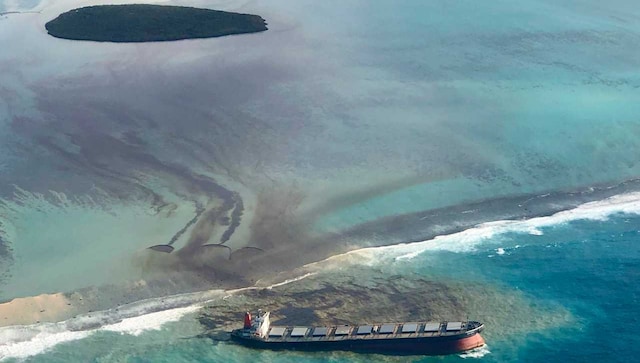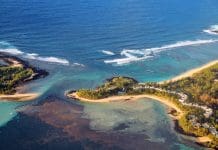On July 25, A Japanese bulk carrier caused an oil spill in Mauritius, creating fears of worsening ecological and economic disaster for the country
The MV Wakashio struck a reef of the southeast coast of Mauritius on July 25, causing over 1000 tonnes of oil to spill, which is believed to have come from a crack in the vessel’s hull.
There are concerns that the remaining 2500 tonnes of oil still on board could spill if the vessel cracks in two.
Mauritian Wildlife Foundation manager, Jean Hugues Gardenne, said: “We are expecting the worst. The ship is showing really big, big cracks. We believe it will break into two at any time.
“So much oil remains in the ship, so the disaster could become much worse. It’s important to remove as much oil as possible. Helicopters are taking out the fuel little by little, ton by ton.”
The small tropical island, with limited resources, has declared a state of environmental emergency and is pleading for international help. Greenpeace said the oil spill was likely to be one of the worst ecological crises Mauritius had ever seen.
Environmental impacts of the spill
The coast of Mauritius is home to a fringing reef covering over 150km which is comprised of over 90 species of coral and many species of fish and other marine life.
The ship was on its way from China to Brazil when it ran aground at Pointe d’Esny, a known sanctuary for rare wildlife. The area also houses wetlands that have been designated as a site of international importance by the Ramsar Convention on Wetlands.
In a statement, Greenpeace said: “Thousands of species around the pristine lagoons of Blue Bay, Pointe d’Esny and Mahebourg are at risk of drowning in a sea of pollution, with dire consequences for Mauritius’s economy, food security and health.”
Due to its pristine reefs and beaches, the country’s economy heavily relies on tourism. Last year tourism contributed $1.6bn to the economy. The recent COVID-19 pandemic has already impacted the tourism sector in Mauritius and this environmental disaster may only exacerbate the problems.
A community response
The French President, Emmanuel Macron, said that France was sending specialist teams and equipment to help Mauritius to deal with the spill. Macron said: “When biodiversity is in danger, there is an urgent need to act. You can count on our support.”
Japan has also sent a a team of six to aid the French.
Until then locals and volunteers were using straw from fields to make barriers against the oil. Others used their own tubes with tights and hair as barriers and some have been cleaning up the islands beaches. Their actions went against government orders asking people to leave the cleanup to local authorities.
At a news conference, Akihiko Ono, executive vice-president of Mitsui OSK Lines “profusely” apologised for the spill and for “the great trouble we have caused”.
He said that the company would do everything in their power to resolve the issue.
A search warrant has been granted by police in Mauritius, allowing them to board the vessel and take items of interest in order to help with an investigation. The ship’s captain will also assist officers with their search.











